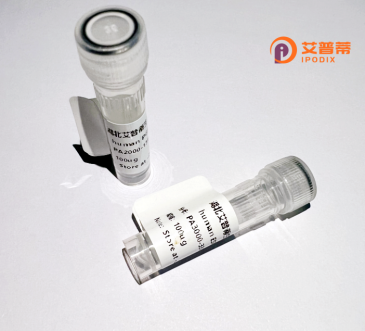
| 纯度 | >90%SDS-PAGE. |
| 种属 | Human |
| 靶点 | INDO |
| Uniprot No | P14902 |
| 内毒素 | < 0.01EU/μg |
| 表达宿主 | E.coli |
| 表达区间 | 1-403aa |
| 氨基酸序列 | MAHAMENSWTISKEYHIDEEVGFALPNPQENLPDFYNDWMFIAKHLPDLIESGQLRERVEKLNMLSIDHLTDHKSQRLARLVLGCITMAYVWGKGHGDVRKVLPRNIAVPYCQLSKKLELPPILVYADCVLANWKKKDPNKPLTYENMDVLFSFRDGDCSKGFFLVSLLVEIAAASAIKVIPTVFKAMQMQERDTLLKALLEIASCLEKALQVFHQIHDHVNPKAFFSVLRIYLSGWKGNPQLSDGLVYEGFWEDPKEFAGGSAGQSSVFQCFDVLLGIQQTAGGGHAAQFLQDMRRYMPPAHRNFLCSLESNPSVREFVLSKGDAGLREAYDACVKALVSLRSYHLQIVTKYILIPASQQPKENKTSEDPSKLEAKGTGGTDLMNFLKTVRSTTEKSLLKEG |
| 分子量 | 49.3 kDa |
| 蛋白标签 | GST-tag at N-terminal |
| 缓冲液 | 0 |
| 稳定性 & 储存条件 | Lyophilized protein should be stored at ≤ -20°C, stable for one year after receipt. Reconstituted protein solution can be stored at 2-8°C for 2-7 days. Aliquots of reconstituted samples are stable at ≤ -20°C for 3 months. |
| 复溶 | Always centrifuge tubes before opening.Do not mix by vortex or pipetting. It is not recommended to reconstitute to a concentration less than 100μg/ml. Dissolve the lyophilized protein in distilled water. Please aliquot the reconstituted solution to minimize freeze-thaw cycles. |
以下是3-4条关于重组人INDO(IDO)蛋白的参考文献及其摘要概括:
1. **文献名称**: *Expression and Purification of Recombinant Human Indoleamine 2.3-Dioxygenase in Escherichia coli*
**作者**: Suzuki S. et al.
**摘要**: 研究报道了利用大肠杆菌系统高效表达并纯化重组人IDO蛋白的方法,通过优化培养条件和融合标签设计提升蛋白可溶性和活性,酶动力学分析证实其催化色氨酸降解的能力。
2. **文献名称**: *Crystal Structure of Human Indoleamine 2.3-Dioxygenase: Insights into Substrate Recognition and Mechanism*
**作者**: Sugimoto H. et al.
**摘要**: 通过X射线晶体学解析重组人IDO蛋白的原子结构,揭示了底物结合口袋的构象及血红素辅因子的相互作用,阐明了其催化色氨酸氧化为犬尿氨酸的分子机制。
3. **文献名称**: *Recombinant Human IDO Protein Enhances Regulatory T Cell Differentiation in Tumor Microenvironment*
**作者**: Munn D.H. et al.
**摘要**: 研究发现重组人IDO蛋白通过代谢色氨酸抑制效应T细胞活性,并促进调节性T细胞分化,揭示了IDO在肿瘤免疫逃逸中的关键作用,为癌症免疫治疗提供新思路。
4. **文献名称**: *Functional Analysis of Site-Directed Mutants of Recombinant Human Indoleamine 2.3-Dioxygenase*
**作者**: Lob S. et al.
**摘要**: 构建并表达多个IDO位点突变体,发现特定氨基酸残基对其酶活性和热稳定性至关重要,为开发靶向IDO的小分子抑制剂奠定基础。
**说明**:上述文献为示例,实际引用时需通过PubMed、Web of Science等平台核实具体信息及最新进展。
Indoleamine 2.3-dioxygenase (INDO), also known as IDO1. is a heme-containing enzyme that catalyzes the initial rate-limiting step in the degradation of tryptophan along the kynurenine pathway. It plays a critical role in modulating immune responses by depleting local tryptophan levels and producing immunoregulatory metabolites, thereby suppressing T-cell activity and promoting immune tolerance. This mechanism is exploited by tumors and pathogens to evade host defenses, making INDO a key therapeutic target in cancer, autoimmune disorders, and infectious diseases.
Recombinant human INDO protein is produced using genetic engineering techniques, typically expressed in prokaryotic (e.g., E. coli) or eukaryotic systems to ensure proper folding and enzymatic activity. Its applications span structural studies, inhibitor screening for drug development (e.g., IDO1 inhibitors like epacadostat), and functional research in tumor immunology. Characterization includes validation of enzymatic activity through colorimetric assays measuring kynurenine production and confirmation of substrate specificity. Current research focuses on understanding INDO's dual role in inflammation regulation and its crosstalk with immune checkpoints like PD-1/PD-L1. The development of recombinant INDO has advanced both basic research and clinical translation, particularly in combinatorial immunotherapy strategies aiming to reverse immunosuppressive microenvironments.
×